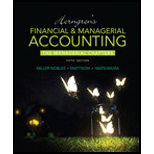
You are planning for a very early retirement. You would like to retire at age 40 and have enough money saved to be able to withdraw $215,000 per year for the next 40 years (based on family history, you think you will live to age 80). You plan to save by making 10 equal annual installments (from age 30 to age 40) into a fairly risky investment fund that you expect will earn 10% per year. You will leave the money in this fund until it is completely depleted when you are 80 years old.
Requirements
- 1. How much money must you accumulate by retirement to make your plan work? (Hint: Find the present value of the $215,000 withdrawals.)
- 2. How does this amount compare to the total amount you will withdraw from the investment during retirement? How can these numbers be so different?
Want to see the full answer?
Check out a sample textbook solution
Chapter 26 Solutions
Horngren's Financial & Managerial Accounting, The Managerial Chapters (6th Edition)
Additional Business Textbook Solutions
Intermediate Accounting (2nd Edition)
Horngren's Accounting (12th Edition)
Marketing: An Introduction (13th Edition)
Business in Action
Essentials of MIS (13th Edition)
Horngren's Cost Accounting: A Managerial Emphasis (16th Edition)
 EBK CONTEMPORARY FINANCIAL MANAGEMENTFinanceISBN:9781337514835Author:MOYERPublisher:CENGAGE LEARNING - CONSIGNMENT
EBK CONTEMPORARY FINANCIAL MANAGEMENTFinanceISBN:9781337514835Author:MOYERPublisher:CENGAGE LEARNING - CONSIGNMENT
